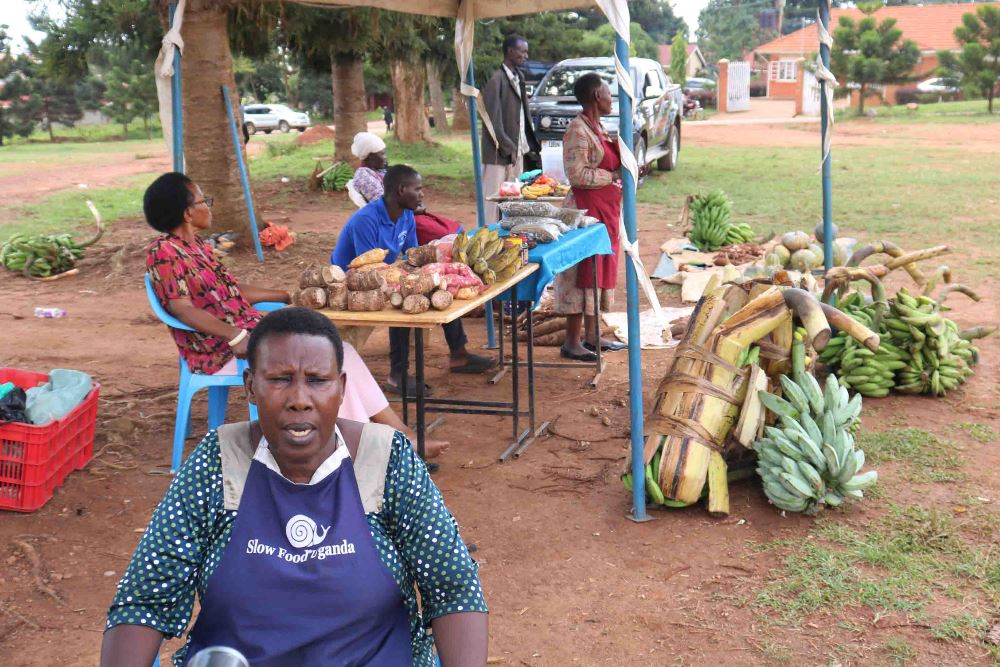
Farming is preferred as the backbone of Uganda’s economy even at the wake of industrialisation. However, for quite some time, many farmers have been regretting their time and money invested in farming as they count losses at the end of long periods of hard work and enormous investment.
In order to beat the odds, farmers under Slow Food Uganda in Mukono and Buikwe districts through the promotion of local food and cash crops have come together to practice farming as a business.
At the time of the harvest, these farmers make sure that they get to the final consumers of their products to cut short the middlemen who reap bigger than them.

Dauda Mugalu, a farmer dealing in local foods at Nakatyaba village in Buikwe sub-county, Buikwe district and a member of Slow Food Uganda, says that they have been mobilised and sensitised to promote local foods and add value to it.
“Slow Food Uganda has helped us to eliminate the cheating middlemen,” Mugalu said, adding, “And with that agriculture has become more profitable to the farmers.”
Mugalu grows vanilla, cassava, sweet potatoes, cocoa, vegetables, and balugu. He ventured into farming right from childhood while in his Primary four. “Though farming has been the sole business I have practiced for more than 30 years, I have been getting little profits compared to what I am earning now,” he said.

Slow Food Uganda, is a Non-Government Organisation whose main objective is to conserve biodiversity and promote indigenous food and fruit species.
The organisation is part of Slow Food International, a global, grassroots organisation founded in 1989 to prevent the disappearance of local food cultures and traditions, and counteract the rise of fast life and combat people’s dwindling interest in the food they eat.

The organization operates in 46 districts across the country with its country headquarters located in Nabuti Cell, Mukono Municipality.
John Wanyu, the Slow Food Uganda Biodiversity officer told Kyaggwe TV that Slow Food Uganda Earth markets bring together the indigenous small scale farmers from the local communities to be able to sell their agricultural products to the final consumers, have saved many farmers after helping them to eliminate middle men.

He added: “Like the people growing bananas, middlemen would buy a bunch of matooke at sh10,000. When he gets to the final consumers, that same bunch is sold at sh35,000. Rewarding him with a profit that almost triples the money he spent to buy it from the farmer. The Earth markets are now breaking the chain, empowering the farmers in their statuses to reach the final consumer.”
“As Slow Food Uganda, our main responsibilities include; saving biodiversity, protecting the environment and fighting climate change. However, we are also entitled to protecting the local farmers who help in protecting biodiversity,” he said.

Bena Nantongo, a local farmer at Nakatyaba village who is among the prominent farmers of balugu, one of the indigenous food species mainly grown in Central Uganda, is among the Slow Food farmer group members in Buikwe district.

Nantongo says after the introduction of Slow Food Markets, she started earning reasonable money from food crops.Nantongo recalls that after the introduction of Slow Food Earth market at Ngogwe, from one of her harvests recently she earned sh500,000, which she had never in the past. Prossy Nakisozi, the Mukono senior entomological assistant, noted that together with other farmers, they are keeping bees that help them to harvest honey, which they sell in the Slow Food Earth market.

In order to handle some of the surplus products which in some days are left as the market day closes, farmers have been given skills of preserving their products.
At the farmers’ office at Nakatyaba, the group has got a solar drier, which they use to sun dry some of their surplus farm products.

Story Compiled by Henry Nsubuga
